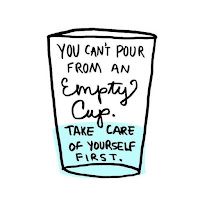There are a lot of questions I find myself asking students frequently... one of those is what do you do to help manage your stress or what do you do for self care. (Same concept asked in different ways.) And it is scary to me how much people struggle to answer, so I want to talk about self care for a moment.
Let's start off by addressing what self care is because a lot of time people think of self care and picture going for a massage or taking a bubble bath and then think, "I don't do self care because I don't do those types of things." And while yes, those are examples of activities that could be self care for some people, there is no limit to the list of things which could be considered good, quality self care.
In order for something to count as self care it needs to be Good for you and it needs to Recharge your batteries. Anything that you do which meets both of those requirements would be considered self-care. But in hitting those requirements that also means that self care is not all leisure/ recreational activities, it is not just everything which isn't school, and it isn't everything that is self-indulgent. It is also important to realize that there are lots of unhealthy coping strategies such as numbing out by mindlessly watching TV or other activities that might be enjoyable, but wouldn't count as true self care because it isn't good for you.
For self care to be effective, you have to know what your body, mind and spirit need. For example, a fun night with friends can fill you up if you’re feeling lonely, but it may exhaust you if you’re feeling run down. So what will be self-care will vary by person and it also changes from moment to moment or day to day. It is important to recognize and know what you need and respond to it intentionally and without guilt. Self care is not selfish, wasteful or only for people who deserve it! It doesn’t need to be complicated or expensive. Self care is NOT a luxury or something you only do IF you have time.
The more stressed and overwhelmed you feel, the more self care you need! But the problem is that people tend not to use coping strategies until their hair is on fire. It is much more effective to have coping skills as a part of everyday life. The best are the ones that are so integrated into your life that you don’t even think of them as coping.
One great strategy for trying to identify what can be self-care for you is to think about what things you are doing in your life when you tend to feel better and what things you notice in your life at times when you’re feeling worse. As you work on writing down the things that help you feel better and the things that make you feel worse, it is a great starting spot to look at how you can do the things that make you feel better more often and do the things that make you feel worse less often or avoid it altogether if possible. So, for example, getting enough sleep helps me to feel better so I could take a nap or go to bed earlier to help meet that need as a form of self care. At the same time, running late makes me feel worse so I can plan ahead, set my clothes out the night before, set a timer 5 minutes before I need to leave for practice so I can transition better, etc. Those are real life, every day self care strategies. It’s about being intentional and doing activities to meet your needs.
We can only manage so much at one time and our problems keep refusing to get in line so we are stressed... which means we all need to focus on self care. So pause right now and ask yourself, "what do I need in order to have a better day today?" and then do it. It might not make it a great day, but if it helps make your day at least a little bit better then it is a step in the right direction towards taking care of you.




No comments:
Post a Comment